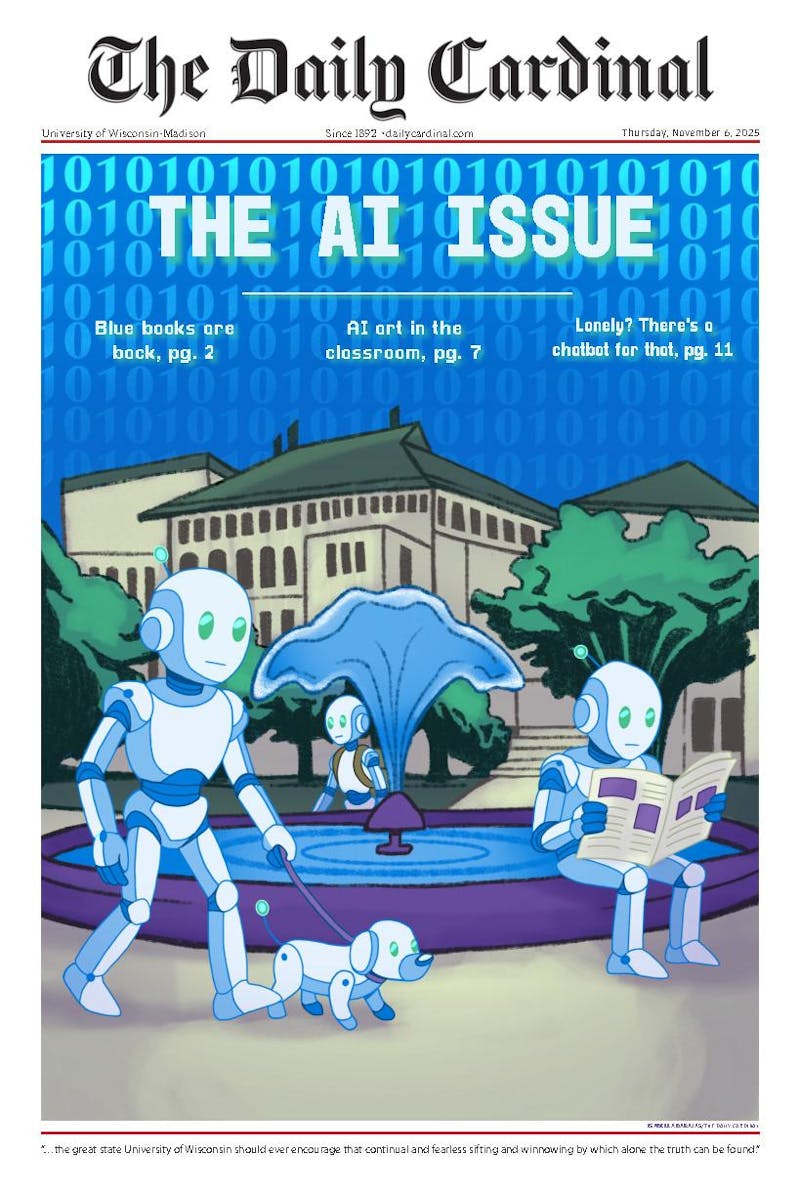PORT WASHINGTON, Wis. – Just 25 miles north of Milwaukee, the historic lakefront town of Port Washington, Wisconsin, has held onto its small-town charm through generations. But recently, the city became Wisconsin’s newest artificial intelligence data center battleground, with developers eager to tap into the Great Lakes region and local residents voicing opposition.
Environmental activists and community members spoke out at common council meetings, while union workers sporting orange sweatshirts and green “I Support Data Center” pins voiced support for the jobs the project will bring to the city.
Vantage Data Centers, the company that gained approval from the Port Washington Common Council in August to build the 672-acre campus, is scheduled to break ground on the project later this month, with construction concluding in 2028. The campus will be operated by multi-billion dollar corporations Oracle and OpenAI.
Vantage was identified as the company responsible for the land purchase in June, with the short turnaround on the project leaving residents of Port Washington conflicted about how the issue was handled by the common council.
“I think it's really disappointing that by the time most people in the area [who] will be directly affected by this learned about it after the town board approved it,” Roxanne Ramirez, a local farmer in Ozaukee County who opposes the data center, told the Daily Cardinal. “I feel really disappointed in the fact that there was no open discussion, like this was all brought to us with them saying … it's a done deal.”
The common council also voted to approve a Tax Increment District, which is pending final approval from the city’s Joint Review Board on Nov. 18. Vantage will pay $175 million up front to Port Washington to improve city infrastructure including expanded wastewater treatment, upgraded sewer lines and a water tower. As property tax numbers rise in the district, the city will reimburse Vantage over a period of 20 years or until Vantage is fully paid back.
“I can’t stay silent while we consider a tax increment to fund a private data center,” said Scott Lone at the Nov. 4 common council meeting. “Let’s be clear, a TID is public money. Our money. It’s meant to help neighborhoods that need a boost, to spark projects that otherwise wouldn't happen. This is a global tech company asking taxpayers to help fund their expansion into the Port Washington community.”
Community members were vocal at the Nov. 4 meeting, noting they hadn’t had a chance to vote on any of the land allocation, there was little to no communication from the common council and news of the initial land purchase was buried in local press in order to avoid pushback.
“[City Council] fasttracked and then annexed the rezoning of this through publishing it through the Ozaukee Press, an outdated media outlet, knowing that most residents won’t consume information from the Ozaukee Press,” Port Washington resident Tracy Finch said at the common council meeting. “This is treating public input like an inconvenience rather than responsibility.”
Finch was not the only resident concerned about transparency from the common council. Riley, a Port Washington resident who asked to remain anonymous, told the Daily Cardinal, “this has been rush, rush, rush, let's go.”
“I just feel like everything has been very hush hush, and it all passed quickly. And you know the timing, over the summer months, when people are busy and not really paying attention to everything, and then all of a sudden, here we are, and it's happening,” Riley said.
Finding the resources
Although Vantage and We Energies, a local electric service company in charge of supplying energy to the project, have claimed renewables will contribute to the portfolio of energy, they were unable to provide clear answers to the common council about those sources at the Nov. 4 meeting. As with many other AI data center protests across the state, the environment has been at the forefront of concern.
Ramirez said the city did not conduct a comprehensive environmental assessment, while other communities across the U.S. have cited adverse environmental impacts after data centers are built in their towns. She described extreme heat pollution and water coming out of faucets, with homeowners filling up buckets in case taps went dry from the data center’s water demands.
“We all bought our houses out here because of the beauty of the landscapes,” Riley said. “We love the bald eagles, the turkeys, the deer, the possums, the cranes, [the] blue herons. Will they all stay, or will they relocate? We have no idea.”
The four buildings that make up the data center will require 1.3 gigawatts of electricity, which could require a $1.4 billion transmission line project to bring energy to the site, according to an American Transmission Co. application to the Public Service Commission of Wisconsin. The path of the transmission lines have been heavily debated, with residents of nearby Fredonia lobbying against the lines coming through their town.
Riley said that community members have expressed concern about how the lines will obstruct their homes. “[We have] to live with these huge high powered electricity lines above [our] homes and in [our] front yards, in [our] backyards, where [our] kids play,” they said.
Port Washington Mayor Ted Neitzke IV claimed in September the data center would only use up to 10,000 gallons of water per day to cool its servers — the main environmental concern — but an analysis published by Clean Wisconsin in November reported that number could range up to 54,000 gallons.
Sourcing the labor
Some of the most vocal support for the data center has come from local unions, who have passionately lobbied the common council, saying the construction jobs created by the project are integral to the local economy.
Chris Olig has been a union worker for 20 years. He’s a current business representative for LiUNA Local 113, a union representing construction workers in the greater Milwaukee area. His workers stand to benefit from Vantage’s new data center and the new jobs it will create.
“The Vantage data center project is going to employ hundreds of local laborers on this project,” Olig said. “There's approximately $8 billion worth of work schedule.”
The project will reportedly create 4,000 temporary construction jobs, 5,600 extra jobs from vendors and just over 300 permanent jobs. According to Olig, the project will bring about $10 billion in total revenue to Port Washington through the form of hotels, restaurants, housing and entertainment.
Of the protests, Olig said the process of public debate was important to solving local issues, also highlighting a “silent majority” of absent supporters represented people who were “fine” with the development.
“In reality, what you're seeing and what you're hearing is a great display of governance where you have the ability to come here, stomp your feet and complain about a project,” Olig said.
Port Washington moved their common council meeting from the normal quarters in the city hall to a nearby banquet center in order to accommodate the exceptionally large crowds. Around 150 community members attended to debate how the city should proceed. Activists and union workers alike acknowledged coming to the table with each other in mind is important.
“What I can say about the people who are complaining about this is not one time have I heard anybody say they hate unions,” Olig said. “They're supportive of the fact that we want to work, and we're supportive of their feelings or adversity to this project.”
Ramirez echoed that sentiment, acknowledging the protesters at the meeting were neighbors and it is important to treat them as such.
“We have a lot more in common with our neighbors here in these union workers than we have with the billionaires who are actually profiting off of our data,” she said. “I think that we’ve all become a little bit comfortable in our bubble with our phones and our social media, and I think that we need to start to reorganize ourselves within our physical communities, get to know our neighbors, and connect with each other face to face.”
Vantage is expected to begin construction later this November. The next common council meeting is scheduled for Nov. 18 where community members plan to continue voicing their opposition and the Joint Review Board will vote on final approval for the TID.
John Ernst is the features editor for The Daily Cardinal. He has written in-depth on refugee resettlement, Milwaukee Public Schools and rural issues, including water contamination and immigrant farming. He also reported for the campus news, science and sports desks.






